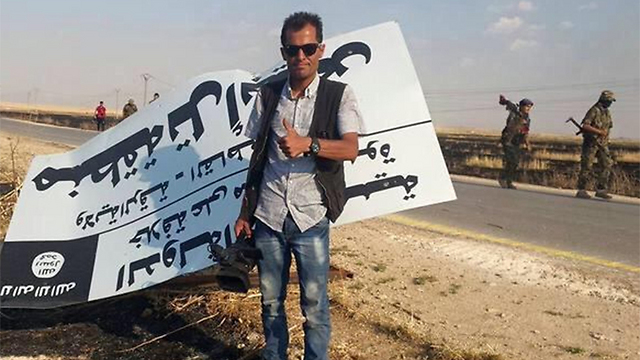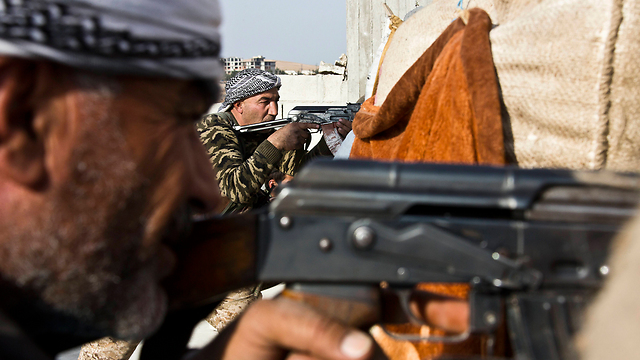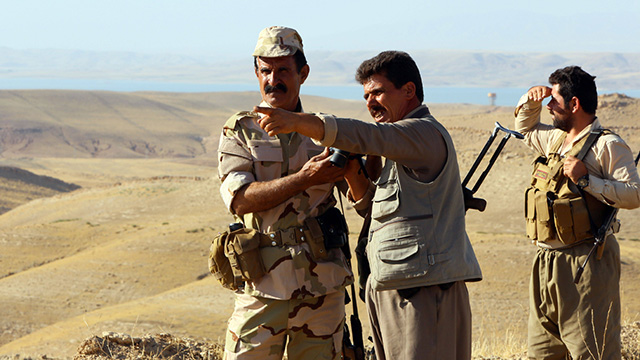The groups are making major advances against IS, forming a contiguous zone of influence in a key region in the conflict.
 After a series of major victories, the Syrian Kurds are proving to be a major player in the US-led campaign against the Islamic State group.
After a series of major victories, the Syrian Kurds are proving to be a major player in the US-led campaign against the Islamic State group.
Aided by coalition air strikes, the Kurdish YPG militia may have dealt IS its worst defeat to date in Syria by seizing the town of Tel Abyad at the Turkish border and cutting a supply route to the jihadists’ de facto capital of Raqqa.
The Kurds in northern Syria now control an uninterrupted 400-kilometer stretch of the Turkish frontier, placing them squarely in an area that the US says needs more action to stop the flow of fighters joining IS.
According to Reuters, the Pentagon called the Kurdish offensive a significant advance that could disrupt supplies to Raqqa and the flow of foreign fighters.
“Islamic State forces had appeared to ‘crack’ in Tel Abyad, and seemed unwilling to confront the Kurdish forces,” Colonel Steve Warren, a Pentagon spokesman, said. The YPG-led force advanced on, and took Tel Abyad in three days.

Kurdish fighters walk past a toppled ISIS sign
The growing Kurdish force is concerning to Turkey, worried by the risk of separatist sentiment among its own Kurds.
Ankara sees the widening Kurdish footprint as a possible threat to its border, and the YPG as little more than an offshoot of the PKK group, which waged a decades-long insurgency for Kurdish rights in Turkey. President Tayyip Erdogan last week accused the West of helping “terrorists”.
But for now, the United States appears willing to risk upsetting its NATO ally to advance the goal of driving back Islamic State in the Syrian half of its self-declared caliphate.
With Raqqa just 80 kilometers (50 miles) to the south, some analysts wonder whether Washington may now go even further by arming the YPG to help it wage war deeper into Islamic State-held territory and to seal the border.
The United States and its allies are bombing Islamic State positions in both Syria and Iraq. The coalition supports the government in Baghdad but is hostile to the government in Damascus, leaving it with few allies on the ground in Syria.
This means the YPG is so far the only significant partner for the US-led alliance in Syria, but the group says its request for arms has yet to be answered.
With or without new weapons, the YPG’s growing role will only strengthen its international standing and its influence over any eventual outcome of the Syrian war.

Kurdish fighters in Kobani, Syria (Photo:AP)
“It gives the Kurds legitimacy and enhances their bargaining position,” said Henri Barkey, a professor of international relations at Lehigh University in the United States.
Syria’s Kurds are part of a Kurdish nation spread across Syria, Turkey, Iran and Iraq, one of the world’s largest ethnic groups without a state.
With the onset of the Syrian uprising in 2011, the Syrian Kurds formed their own administration in three separate areas of northern Syria, coordinating with Damascus to expand into areas where the state was retreating. The capture of Tel Abyad means two of those regions are now geographically connected.
The Syrian Kurds say they do not aspire to found an independent state, but see their model of regional autonomy as one that could form the basis for an eventual settlement to the war now in its fifth year. The capture of Tel Abyad has created a link between two of the Kurdish autonomous zones, or cantons.
Turkey’s Erdogan has accused Syrian Kurds of displacing Arab and Turkmen residents from some areas they occupy, and some Arab refugees fleeing area have complained of harsh treatment.
Border Control
The YPG is confident it can secure new areas of the frontier near Tel Abyad. The Kurdish administration in the northeast has already managed to secure large sections of Syria’s border early on in the crisis, said Redur Xelil, a spokesman.
“We are committed to protecting these borders because that way we are protecting our existence,” he said. “We should be supported with weapons and equipment because the YPG has shown its effectiveness in expelling Daesh more than any other force.”
The YPG and the United States joined forces for the first time last year to repel an Islamic State attack on the town of Kobani. The cooperation has deepened since then.

Kurdish fighters fighting ISIS (Photo:AFP)
The YPG has driven Islamic State from swathes of the northeastern province of Hasaka – a region important in the fight against Islamic State because it borders areas held by the group in Iraq.
The Pentagon spokesman said the Tel Abyad advance was “a great example of the combination of airpower – devastating airpower – along with seasoned, trained and capable ground forces”.
But the Syrian Kurds complain Western support remains far below the level received by their Iraqi Kurdish cousins.
Tensions with Damascus
While they have proved effective fighting Islamic State in Kurdish areas, questions remain over how well the YPG would perform in Arab parts of Syria.
Their attack on Tel Abyad – an ethnically mixed area – was aided by smaller Syrian Arab rebel groups that are part of the more secular-minded opposition to President Bashar Assad.
In Hasaka province, the Syrian Kurds still share control of two cities with the Syrian government. The sides have mostly left each other to their own devices.
There are, however, signs of strain. The Kurds’ alliance with Washington has fuelled suspicions in Damascus of a conspiracy to break up Syria, while the Kurds are irritated by what they see as government attempts to recover lost influence in the region.
“The regime will with time get weaker,” said Nasir Haj Mansour, a Kurdish official in the northeast. “I do not imagine the regime will be able to strengthen its position.”



Leave a Reply
You must be logged in to post a comment.